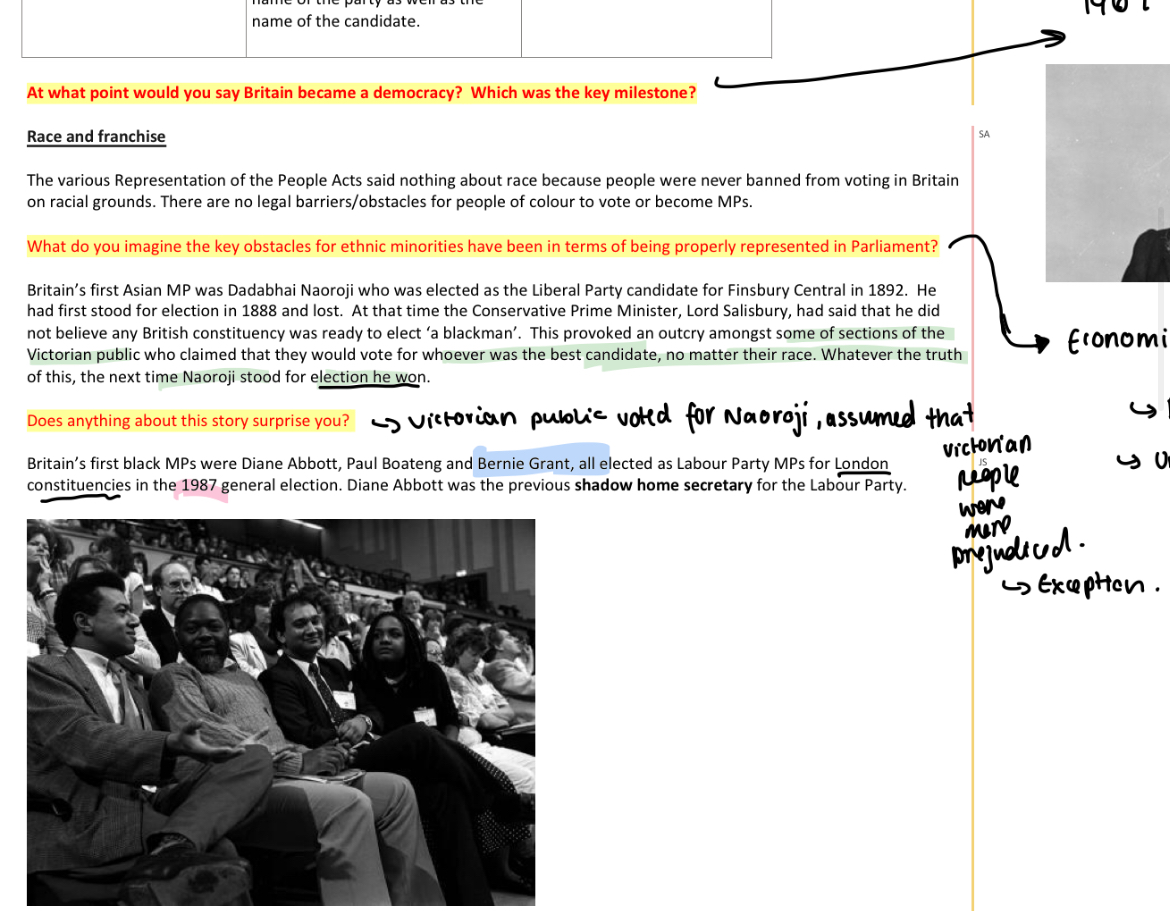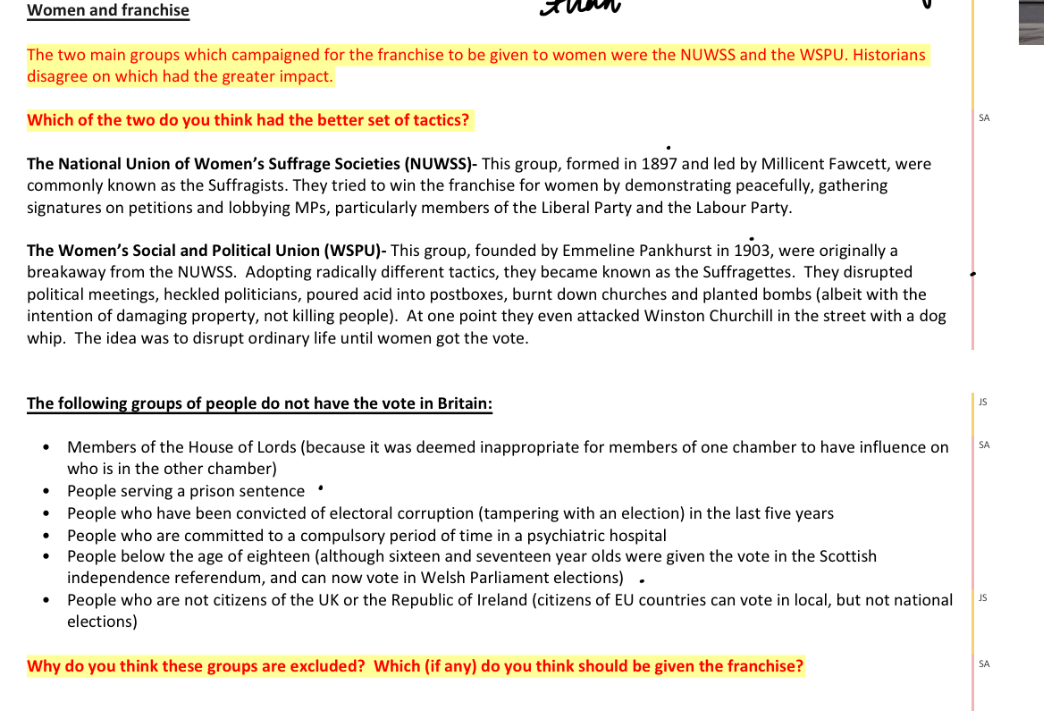Franchise and Argument for extension
1/4
There's no tags or description
Looks like no tags are added yet.
Name | Mastery | Learn | Test | Matching | Spaced | Call with Kai |
|---|
No study sessions yet.
5 Terms
Race and Franchise

Women and Franchise

Contemporary movements to extend the franchise
The Votes at 16 Coalition and the Electoral Reform Society are campaigning to extend the vote to sixteen and seventeen year olds. Their campaign is supported by the Labour Party, the Liberal Democrats, the Greens, the SNP and Ruth Davidson, the former leader of the Scottish Conservatives. They have achieved two important successes. Sixteen and seventeen year olds voted in the Scottish independence referendum in 2014, and since then have been allowed to vote in local and devolved elections. In June 2020 the Welsh Parliament extended the franchise to 16-17 years olds in Welsh Parliament elections.
The Labour leader, Keir Starmer, made reducing the voting age in England to 16 a key promise in his 2024manifesto amid claims by Tories that he as trying to rig future elections and bring politics to the classroom.
The Votes at 16 Coalition and the Electoral Reform Society are campaigning to extend the vote to sixteen and seventeen year olds. Their campaign is supported by the Labour Party, the Liberal Democrats, the Greens, the SNP and Ruth Davidson, the former leader of the Scottish Conservatives. They have achieved two important successes. Sixteen and seventeen year olds voted in the Scottish independence referendum in 2014, and since then have been allowed to vote in local and devolved elections. In June 2020 the Welsh Parliament extended the franchise to 16-17 years olds in Welsh Parliament elections.
The Labour leader, Keir Starmer, made reducing the voting age in England to 16 a key promise in his 2024manifesto amid claims by Tories that he as trying to rig future elections and bring politics to the classroom.
Prisoners voting rights
Prisoner's voting rights
The Scottish Parliament legislated in this area in 2020. Scottish prisoners ordinarily be resident in Scotland serving a sentence less than 12-months are now eligible to vote in Scottish Parliament, local and national park elections.
The Senedd Cymru/ Welsh Parliament is still considering possible reforms to prisoner voting rights.
The challenge and debate over prisoner's voting rights:
In 2001 the ban was challenged by three convicted prisoners. The domestic courts rejected the challenge and one of the prisoners, John Hirst, then took his case to the European Court of Human Rights ECtHR.
October 2005: The case of Hirst v United Kingdom (No 2), the ECtHR ruled that the UK’s ban on all serving prisoners from voting contravenes Article 3 of Protocol No 1 of the European Convention on Human Rights (ECHR). The central element to the ECtHR ruling was that the UK’s blanket ban on prisoner voting was indiscriminate and disproportionate.
Wider repercussions of The Hirst (No 2):
1. It set off a political debate largely focused on the constitutional issues raised by the judgment and the importance of parliamentary sovereignty.
2.2005: Labour Government considered the ban on prisoners voting was appropriate but was conscious of the need to meet its obligations under international law to rectify the contravention of Article 3.
3.2013: a Joint Committee scrutinising the Bill recommended that all prisoners serving sentences of 12 months or less should be entitled to vote in all UK parliamentary, local and European elections. The Government did not formally respond, and these proposals were scrapped
Prisoner's voting rights
The Scottish Parliament legislated in this area in 2020. Scottish prisoners ordinarily be resident in Scotland serving a sentence less than 12-months are now eligible to vote in Scottish Parliament, local and national park elections.
The Senedd Cymru/ Welsh Parliament is still considering possible reforms to prisoner voting rights.
The challenge and debate over prisoner's voting rights:
In 2001 the ban was challenged by three convicted prisoners. The domestic courts rejected the challenge and one of the prisoners, John Hirst, then took his case to the European Court of Human Rights ECtHR.
October 2005: The case of Hirst v United Kingdom (No 2), the ECtHR ruled that the UK’s ban on all serving prisoners from voting contravenes Article 3 of Protocol No 1 of the European Convention on Human Rights (ECHR). The central element to the ECtHR ruling was that the UK’s blanket ban on prisoner voting was indiscriminate and disproportionate.
Wider repercussions of The Hirst (No 2):
1. It set off a political debate largely focused on the constitutional issues raised by the judgment and the importance of parliamentary sovereignty.
2.2005: Labour Government considered the ban on prisoners voting was appropriate but was conscious of the need to meet its obligations under international law to rectify the contravention of Article 3.
3.2013: a Joint Committee scrutinising the Bill recommended that all prisoners serving sentences of 12 months or less should be entitled to vote in all UK parliamentary, local and European elections. The Government did not formally respond, and these proposals were scrapped
Election Act 2022
The Elections Act 2022 mean that individuals in Britain will be required to show photographic identification when voting at polling stations in from May 2023.
The changes were massively controversial, with arguments in favour of voter ID generally stressing the improved security and integrity brought by eliminating voter fraud. The list includes a range of concessionary travel passes provided for the elderly and disabled people, but it excludes student or young person’s travel cards.
Types of identification that will be accepted at polling stations:
A passport issued by the UK, Commonwealth or EEA state.
A driving licence issued by the UK, Channel Islands, the Isle of Man or EEA state
A biometric immigration document issued by the UK.
A Proof of Age Standards Scheme hologram card
A Ministry of Defence identity card.
An Older Person’s Bus Pass, Disabled Person’s Bus Pass, Oyster 60+ Card, Freedom Pass
A disabled person’s blue badge.
A national identity card issued by an EEA state.
An electoral identity document or card